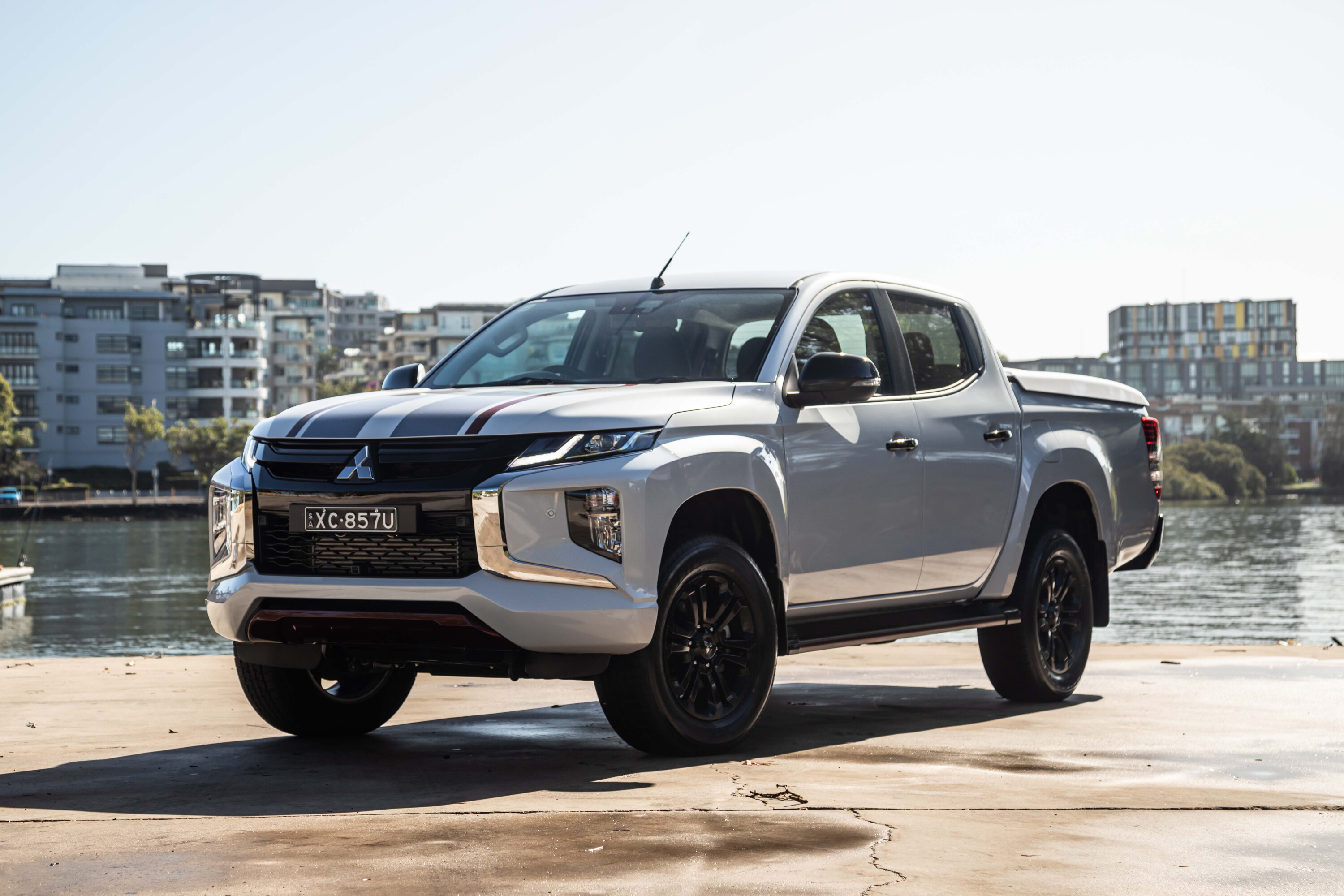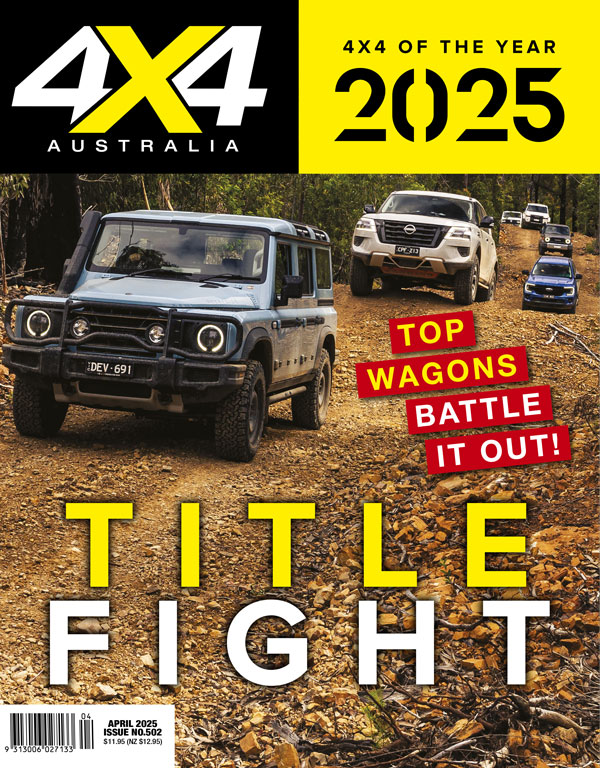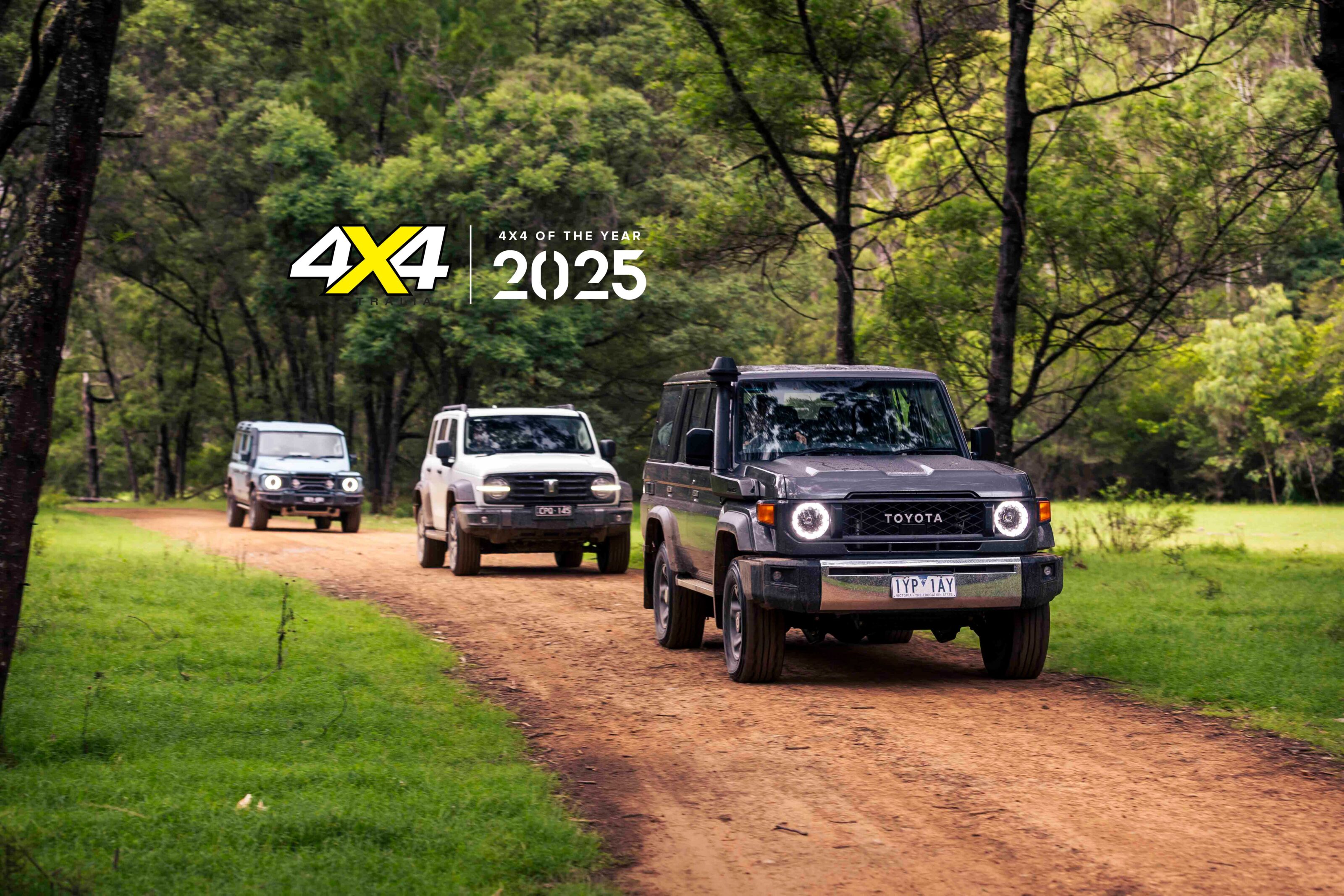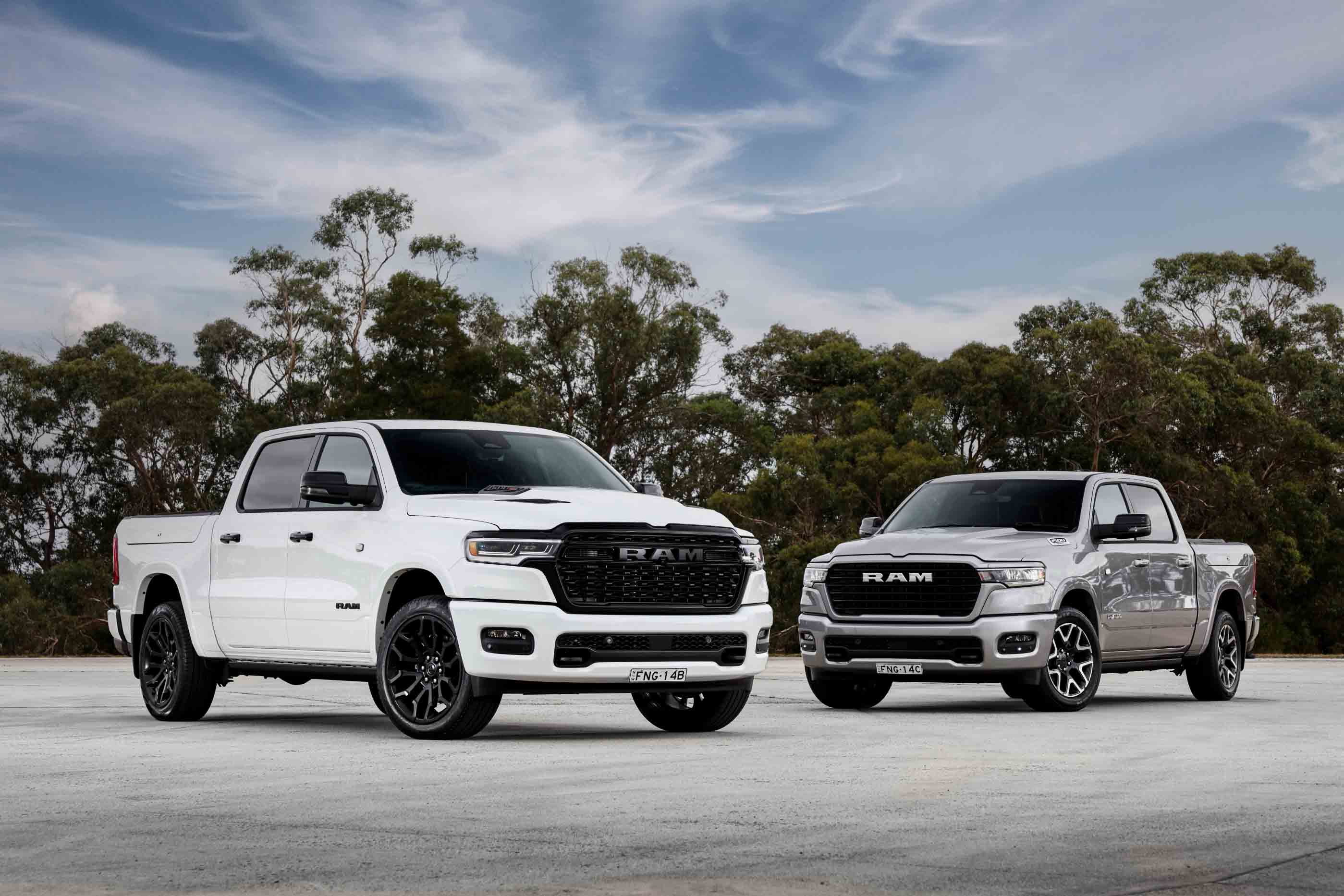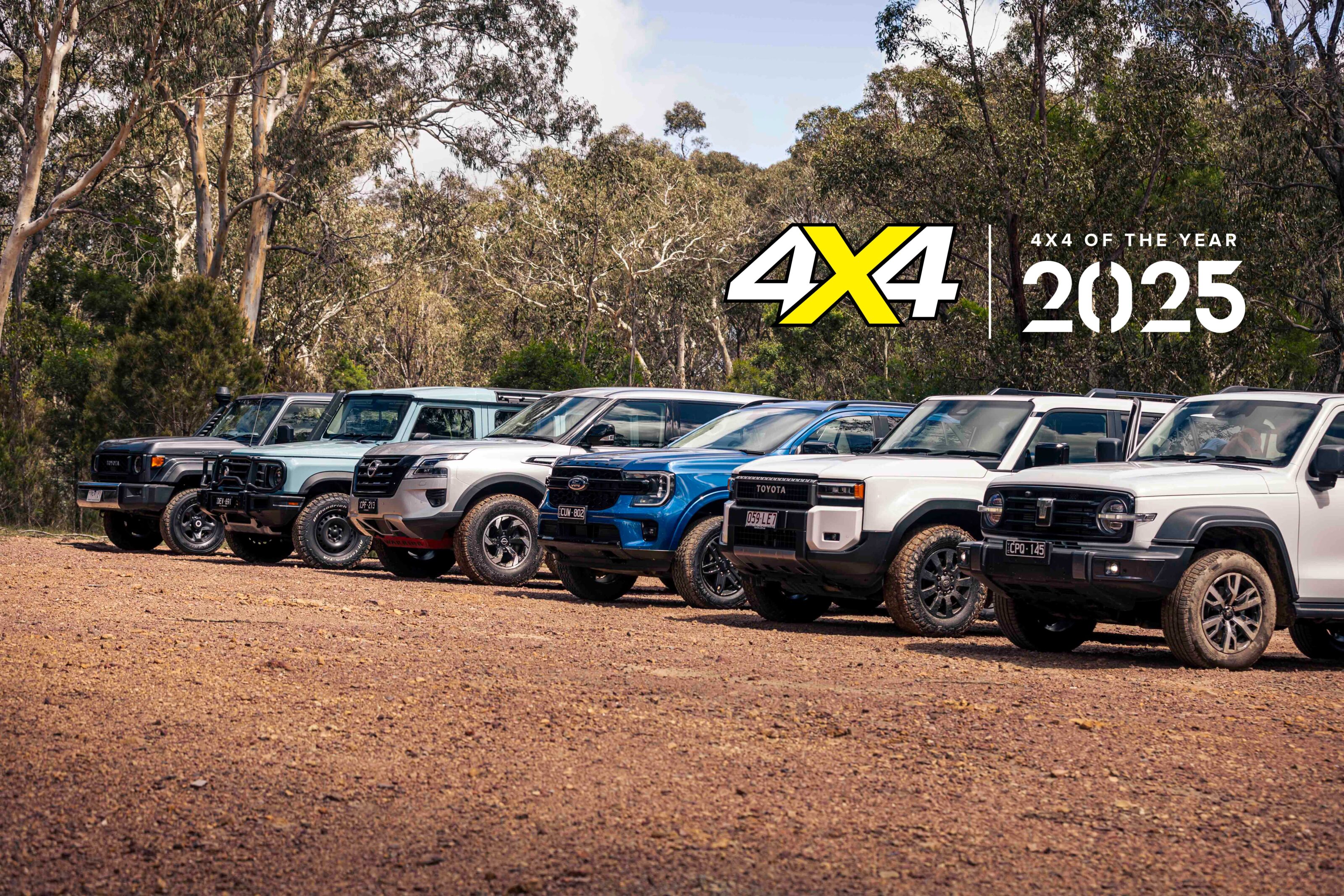Score breakdown
Things we like
- Value
- Handier in town than key alternatives
Not so much
- Not as big or as powerful as some, lower towing capacity than rivals
The past-gen Mitsubishi MR Triton is a smartly priced vehicle in an extremely competitive ute market. It has since been replaced by the current-gen 2024 Triton MV.
Smaller and more nimble than most of its ute contemporaries, all 4×2 and 4×4 variants of the Triton MR utilise a 2.4-litre MIVEC turbo-diesel engine that generates 133kW and 430Nm.
The majority of the Triton MR range is occupied by double-cab versions, but single-cab and club-cab body styles are also available, with either cab-chassis or pick-up configurations. The Triton’s 10-year warranty and 10-year capped price servicing is industry-leading.
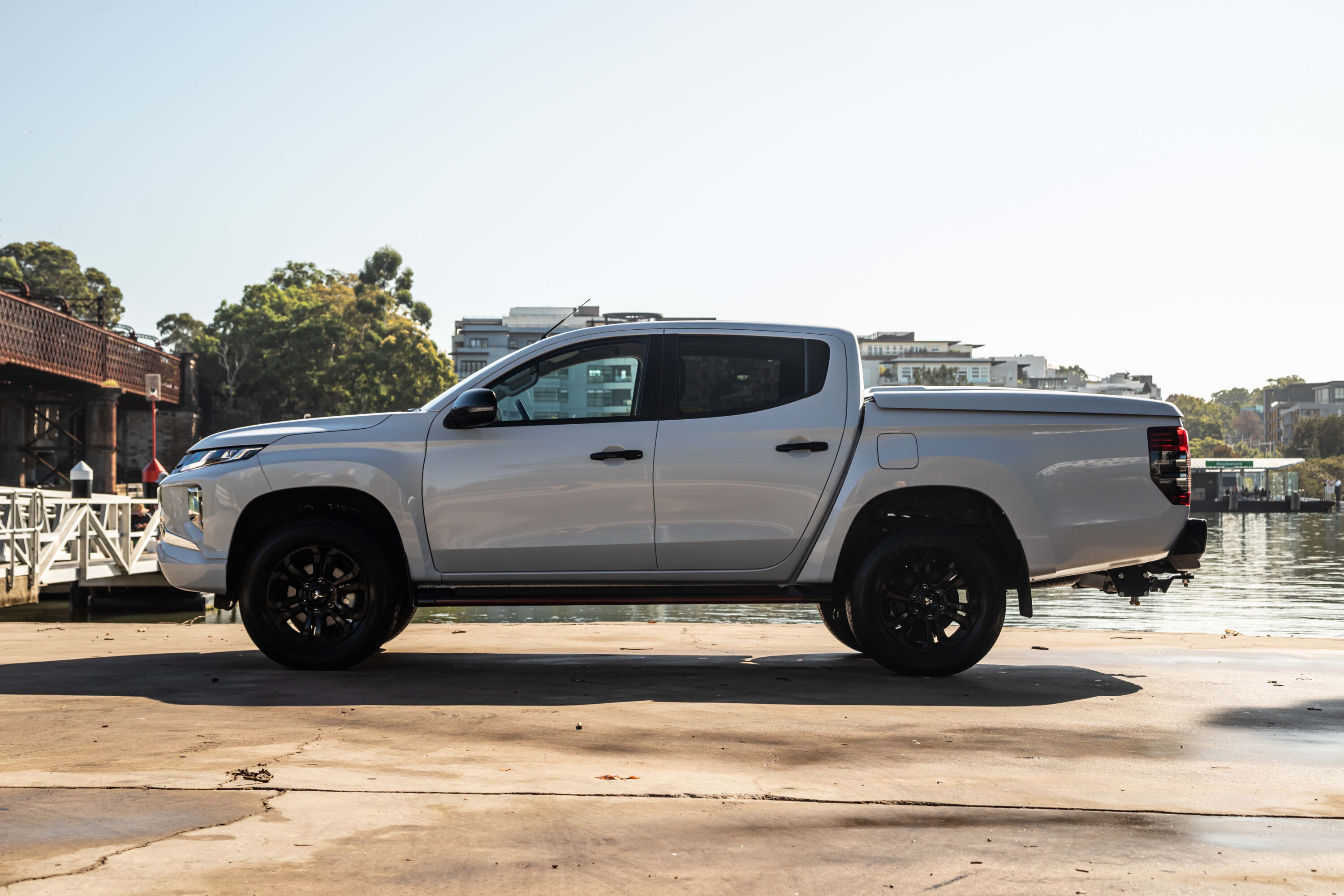
JUMP AHEAD
- Pricing
- What body styles are available for the Mitsubishi Triton?
- What features are standard in every Mitsubishi Triton?
- What key features do I get if I spend more?
- How safe is the Mitsubishi Triton?
- How comfortable & practical is the Mitsubishi Triton?
- How big is the tray/tub?
- Which Mitsubishi Triton engine uses the least fuel?
- What is the Mitsubishi Triton’s towing capacity?
- How long is the warranty and what are the Mitsubishi Triton’s servicing costs?
- Which version of the Mitsubishi Triton does 4X4 Australia recommend?
- What are the Mitsubishi Triton’s key rivals?
Pricing
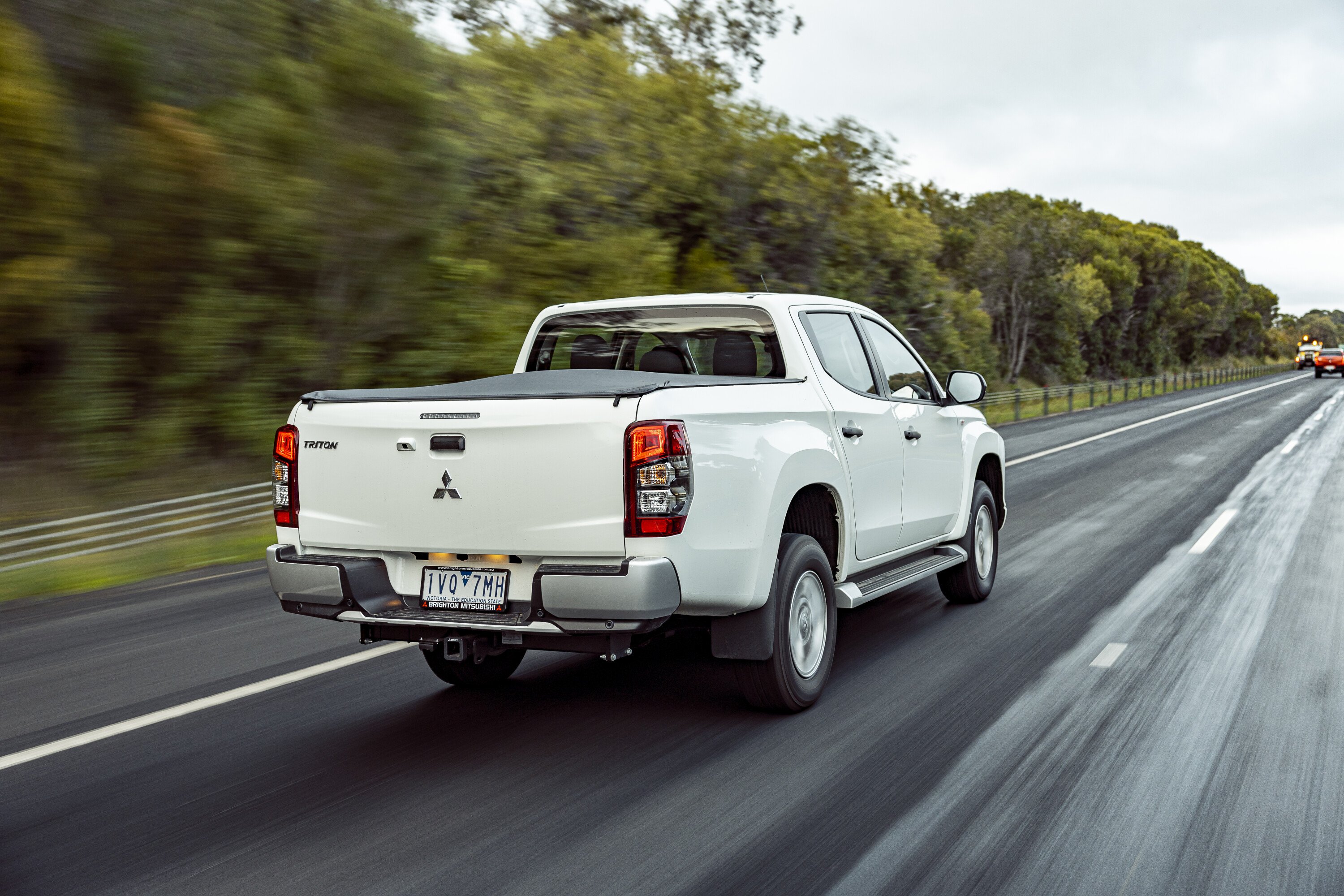
What body styles are available for the Mitsubishi Triton?
The Triton MR is available in 2WD and 4WD, depending on the version. It is classed as a light commercial vehicle, with double-cab, single-cab and club-cab variants available, and with a cab-chassis or pick-up configuration.
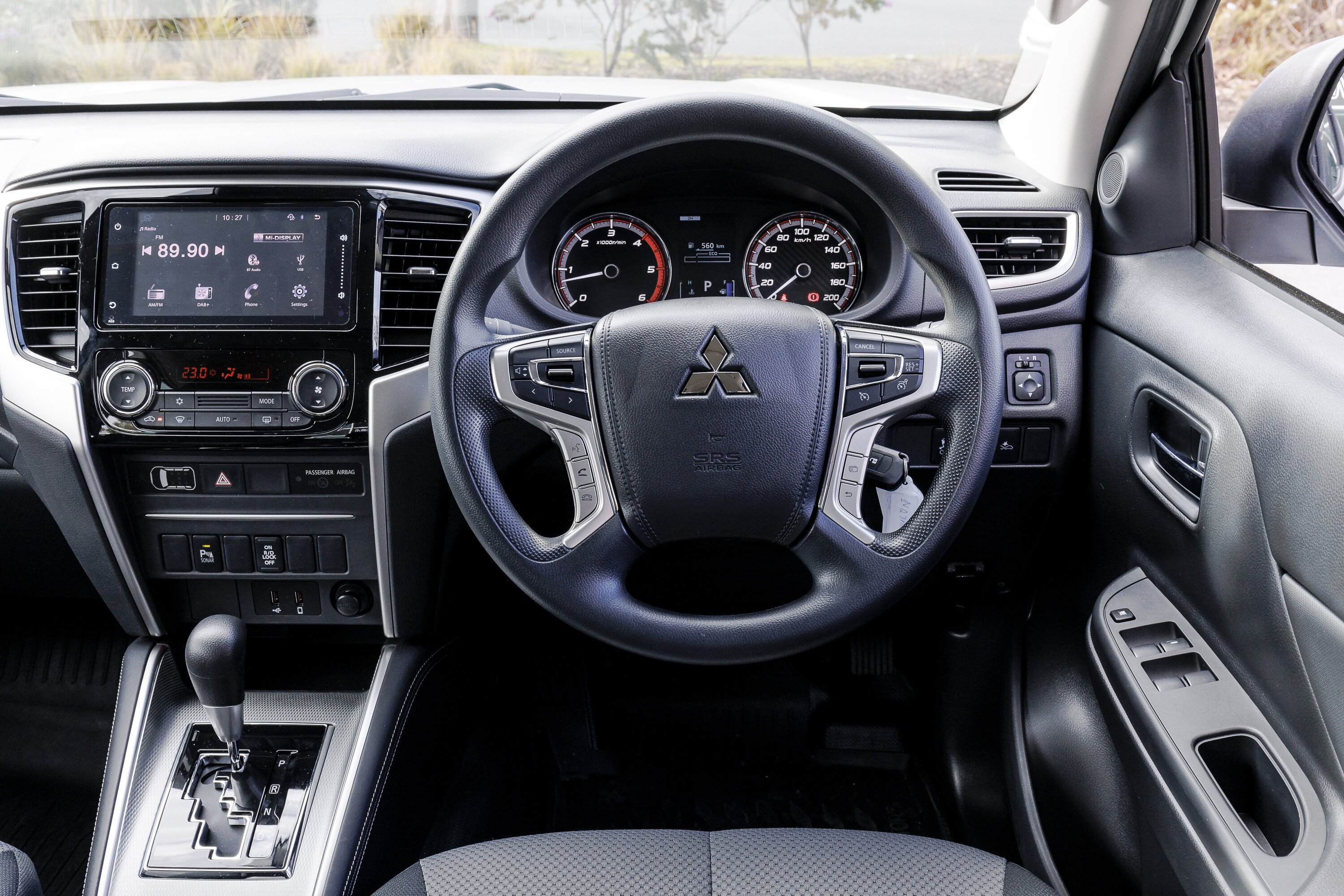
What features are standard in every Mitsubishi Triton?
The features listed below are standard in the entry-level model and will appear in higher-grade models, unless replaced by more premium equivalent features.
| 2023 Mitsubishi Triton standard features | |
|---|---|
| 2.4-litre MIVEC turbo-diesel engine | Mudflaps (front) |
| Seven-inch touchscreen | Air-conditioning |
| Android Auto and Apple CarPlay connectivity | Tilt and telescopic steering column |
| Heavy duty suspension | Cruise control |
| Front skid plate | Three-spoke steering wheel |
| Front tow hook | Accessory power socket |
| Side steps | Seven airbags |
| Halogen headlights | Reversing camera (depending on tray) |
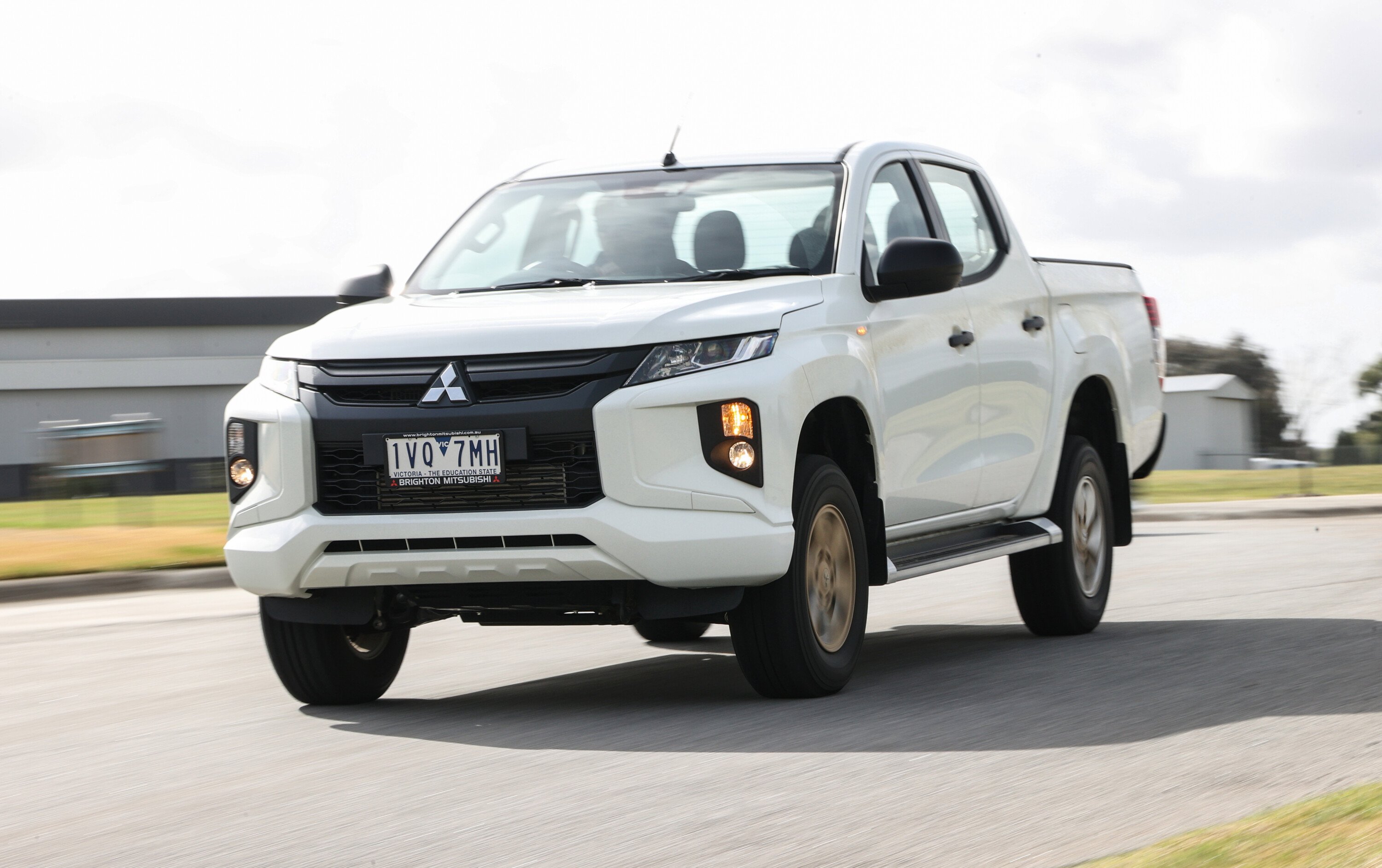
What key features do I get if I spend more?
Opt for the GLX single-cab chassis 2WD base model and it’ll be equipped with the above features.
Upgrade to the 4WD version of the same model and it’ll add an Easy Select 4WD system, two-speed transfer case, 17 x 7-inch steel wheels, a free-wheeling front axle and a 4WD indicator.
The GLX+ double-cab adds:
| 2023 Mitsubishi Triton GLX+ features |
|---|
| 16-inch alloy wheels |
| Climate-control air-conditioning |
| A rear diff lock |
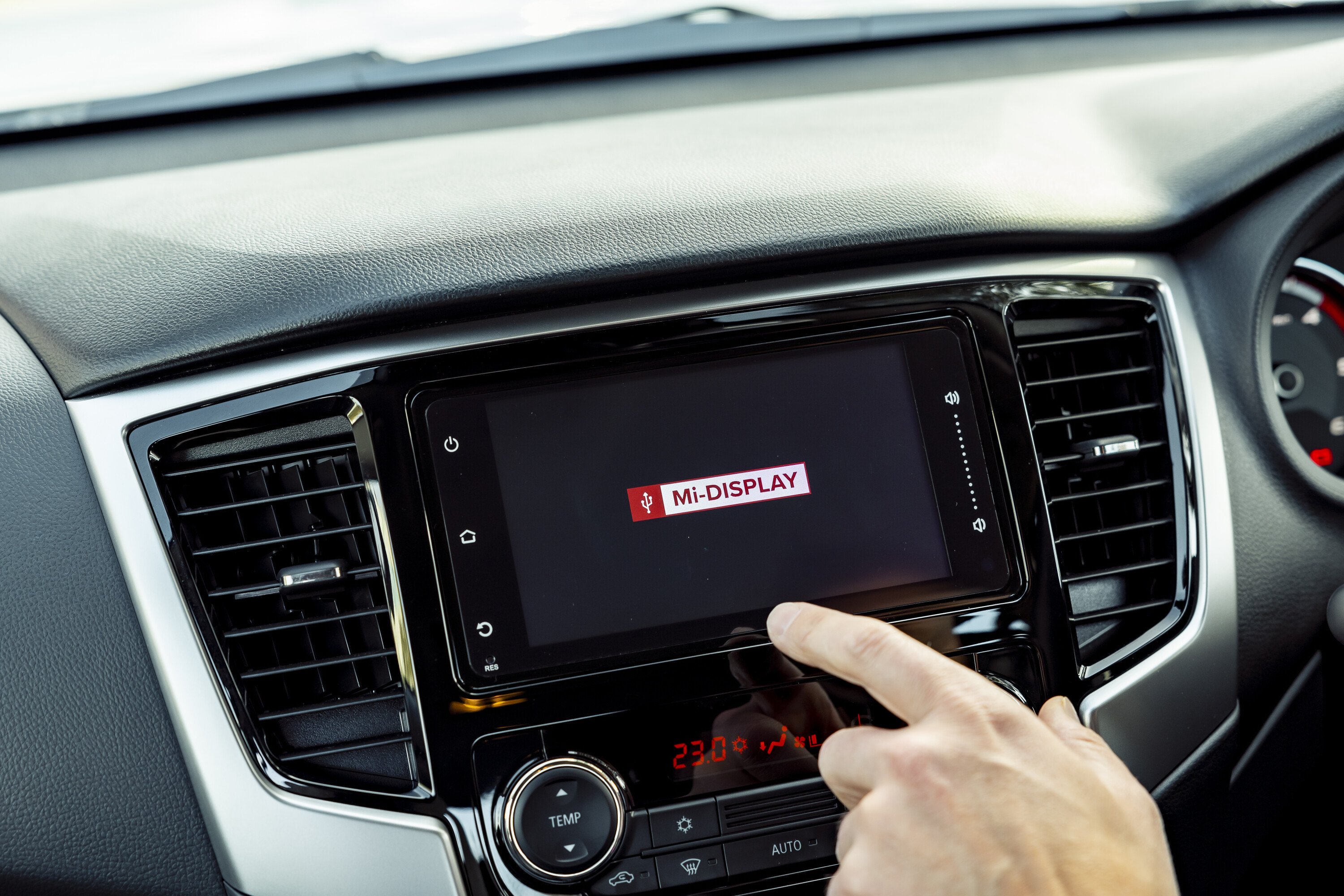
Upgrading to a GLX-R double-cab adds:
| 2023 Mitsubishi Triton GLX-R features |
|---|
| 18 x 7.5-inch black alloy wheels |
| H/T tyres |
| Leather-bound gearshift and steering wheel |
| Carpet floor |
| More chrome and black design touches. |
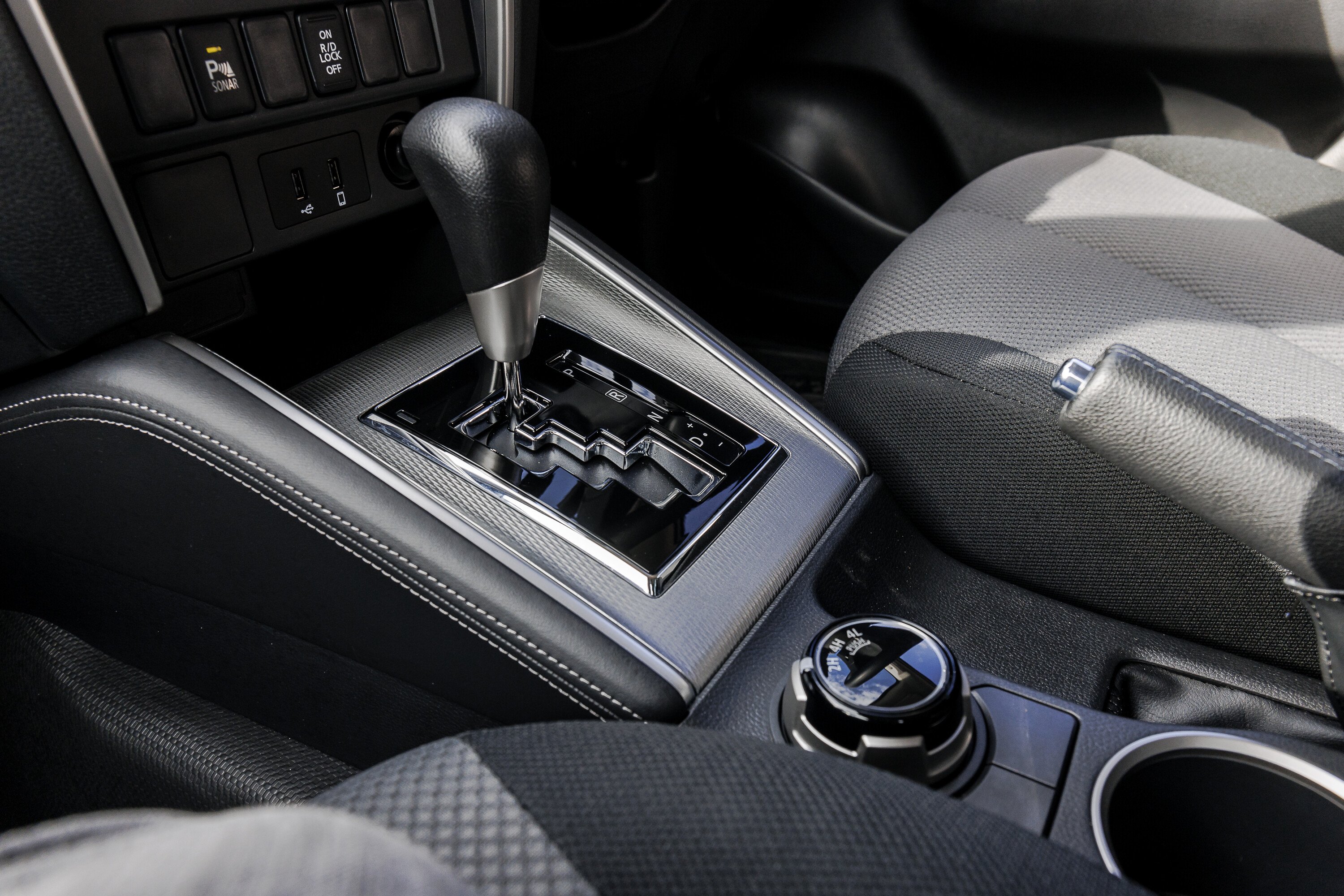
Paying more again for a GLS double-cab adds:
| 2023 Mitsubishi Triton GLS features | |
|---|---|
| Paddle shifters (auto only) | Six speakers |
| Super Select II 4WD system | Second-row USB power supply |
| Centre diff | Hill Descent control |
| 18 x 7.5 two-tone alloy wheels | Off-Road mode |
| LED DRLs | Auto high-beam |
| Smart key and one-touch start | Blind-Spot warning and Lane Change assist |
| Dual-zone climate control | Rear Cross Traffic Alert |
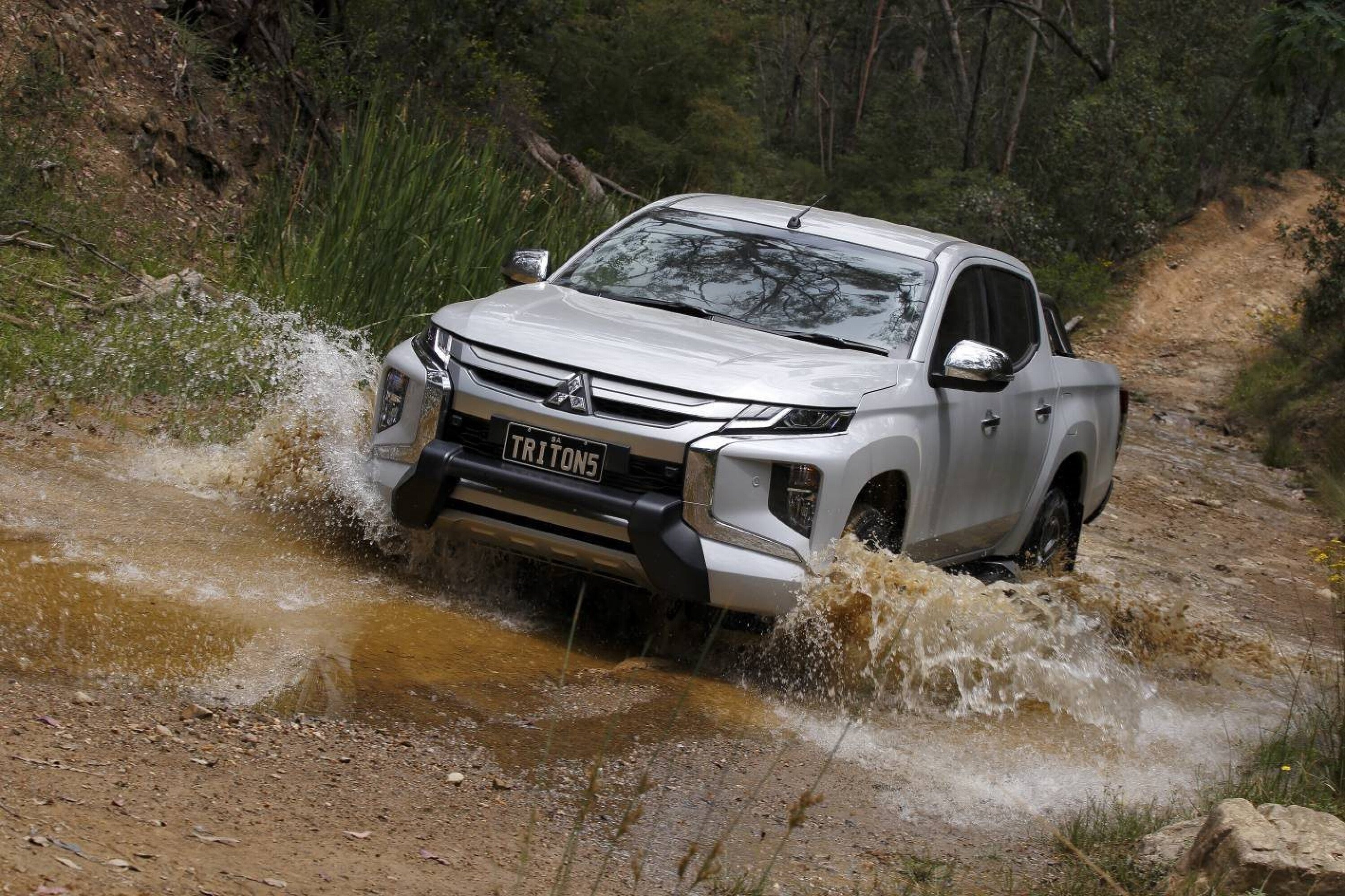
The GSR, the most expensive version, comes with a few aesthetic differences, including:
| 2023 Mitsubishi Triton GSR features | |
|---|---|
| Six-speed auto transmission with manual shift mode as standard. | Heated front seats |
| Black roof | Artificial leather door trim |
| Black grille | Multi-Around Monitor |
| 18 x 7.5 inch black alloy wheels | Tan Orange interior option |
| Black rear bumper | Leather-appointed seats |
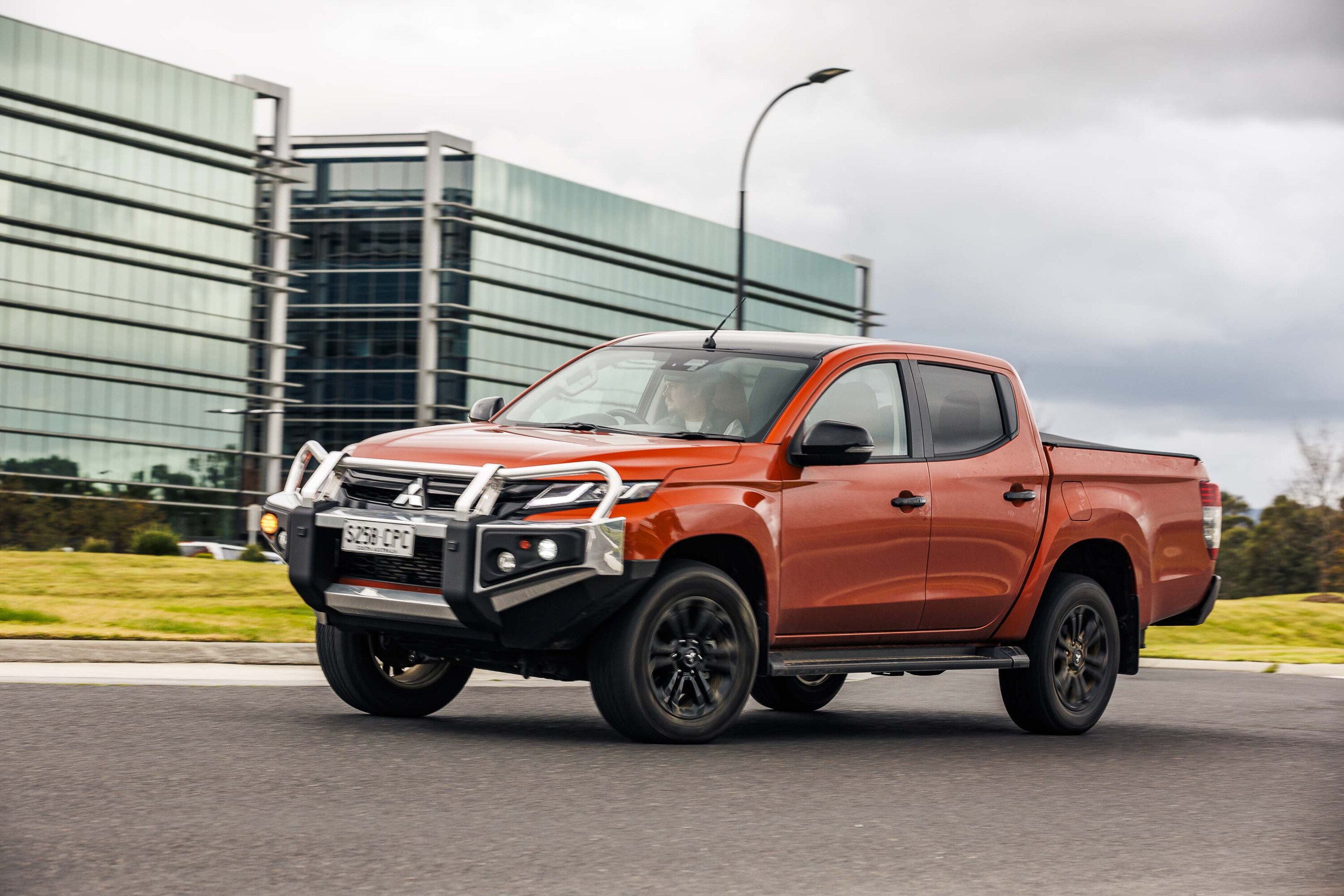
How safe is the Mitsubishi Triton?
The Triton MR received a five-star ANCAP safety rating back in 2015, but all models built from January 2023 are currently classified as “unrated”.
Still, all Triton models are equipped with a speed limiter, Emergency Stop Signal function, Emergency Brake Assist, Hill Start Assist, Active Stability Control, Trailer Stability Assist, Active Traction Control, ABS and EBD.
All models are also fitted with a full suite of airbags: driver and front passenger, driver and front passenger side, curtain, and driver’s knee.
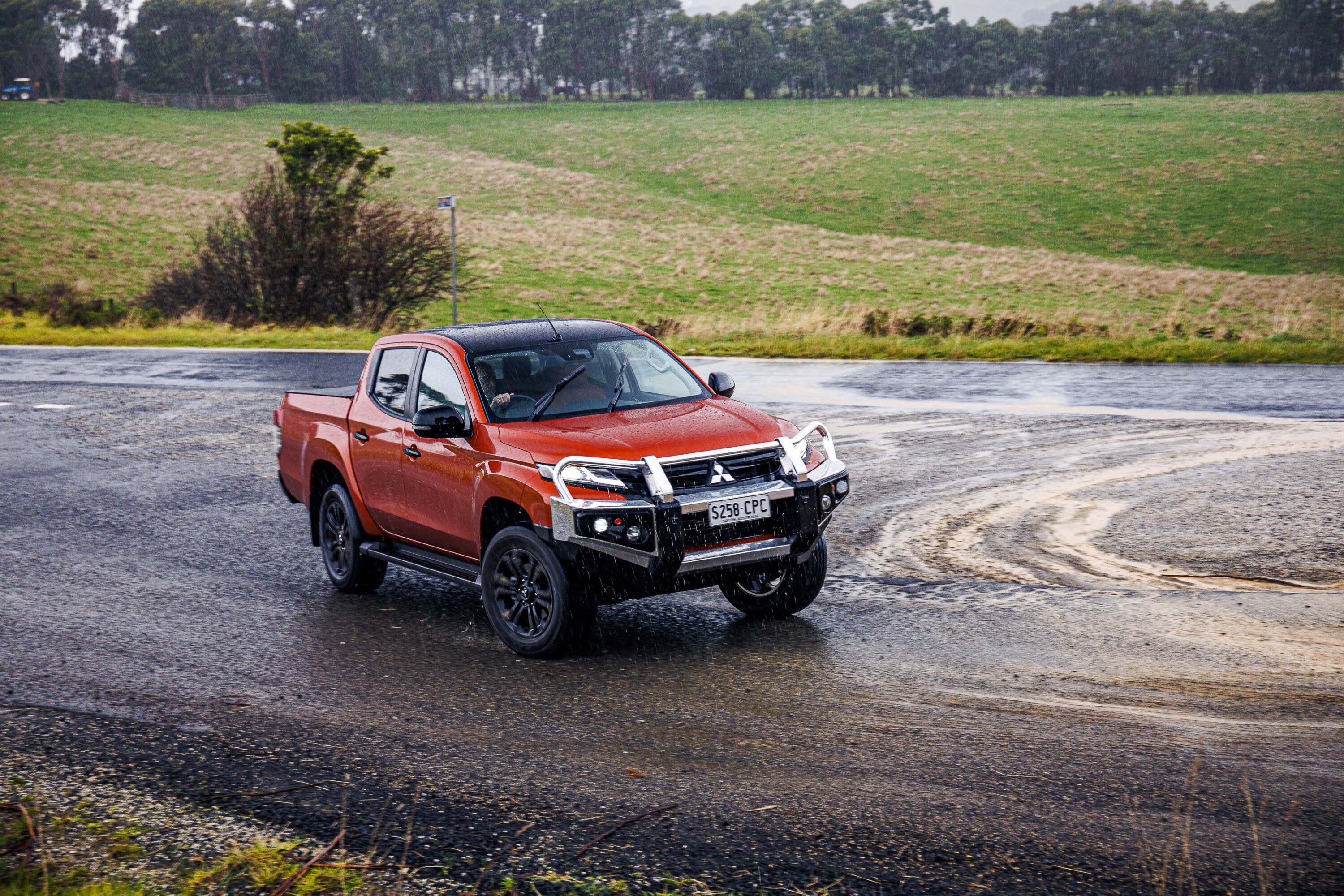
Club-cab and double-cab models are fitted with a Forward Collision Mitigation system (FCM) with pedestrian detection, as well as Lane Departure Warning.
However, to get Blind Spot Warning, Lane Change Assist, Rear Cross Traffic Alert and the Ultrasonic acceleration Mitigation System, buyers must opt for the more up-spec GLS or GSR pickups.
Rear-view cameras and rear parking sensors are standard on pick-up variants only, while front parking sensors are only standard on GLS and GSR pick-ups. A Multi-Around Monitor system is standard with the GSR and optional with the GLS.
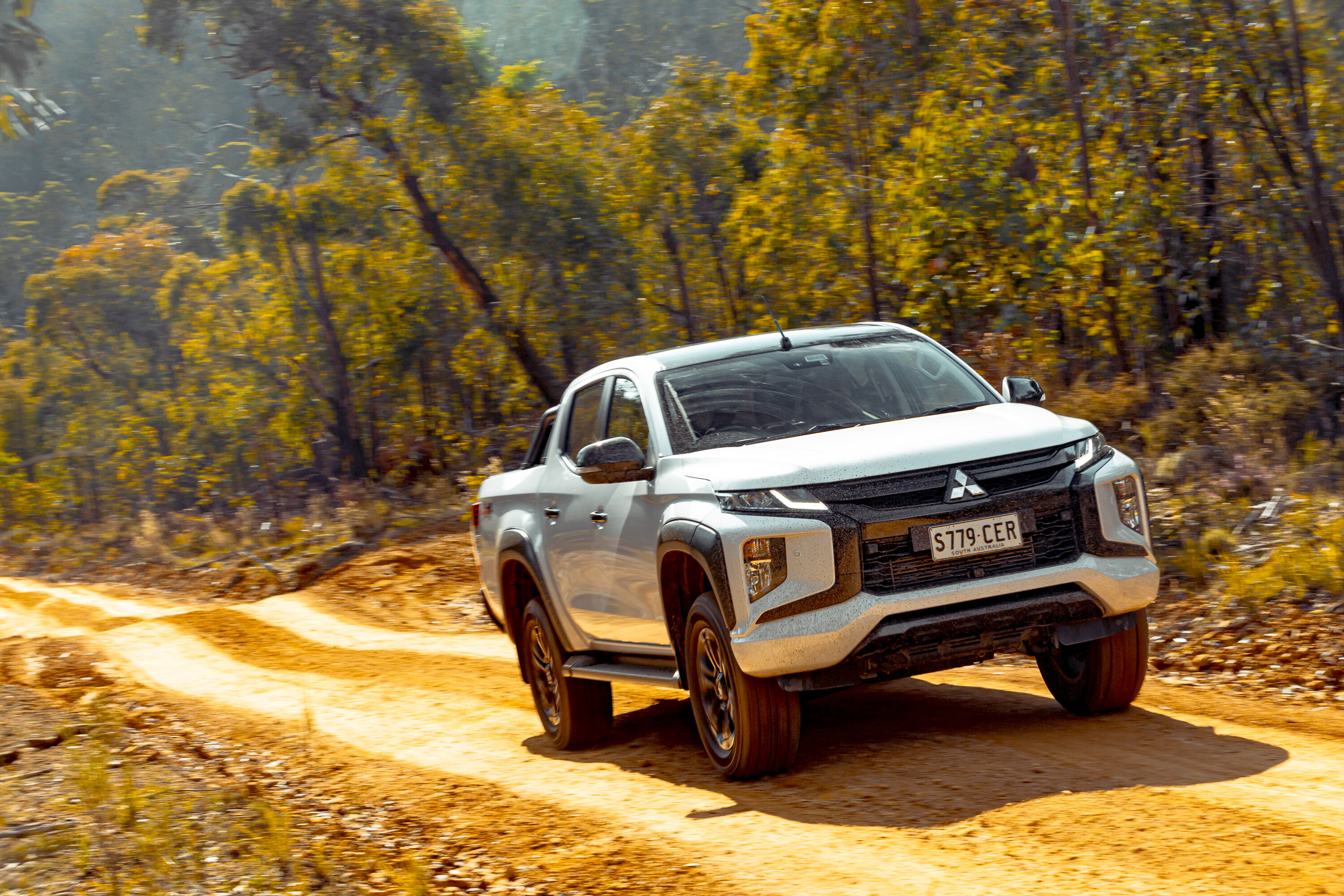
How comfortable and practical is the Mitsubishi Triton MR?
In GLX+ guise, the ute’s cabin is rather utilitarian, as befits its trade-focused purpose.
Its single-zone air-conditioning system and turnkey ignition are outdated, and the infotainment system – consisting of a small 7.0-inch touchscreen – can be slow and confusing to navigate. However, the cabin has an abundance of storage pockets and drink holders, including big bottle holders in the doors, two USB-A points, and a 12-volt power port.
Move up to the GSR and the traditionally blue-collar ute has been updated with tan orange upholstery and leather-covered touchpoints. However, the dashboard still has plenty of hard plastic and the second-row seats are a bit thin but surprisingly supportive.
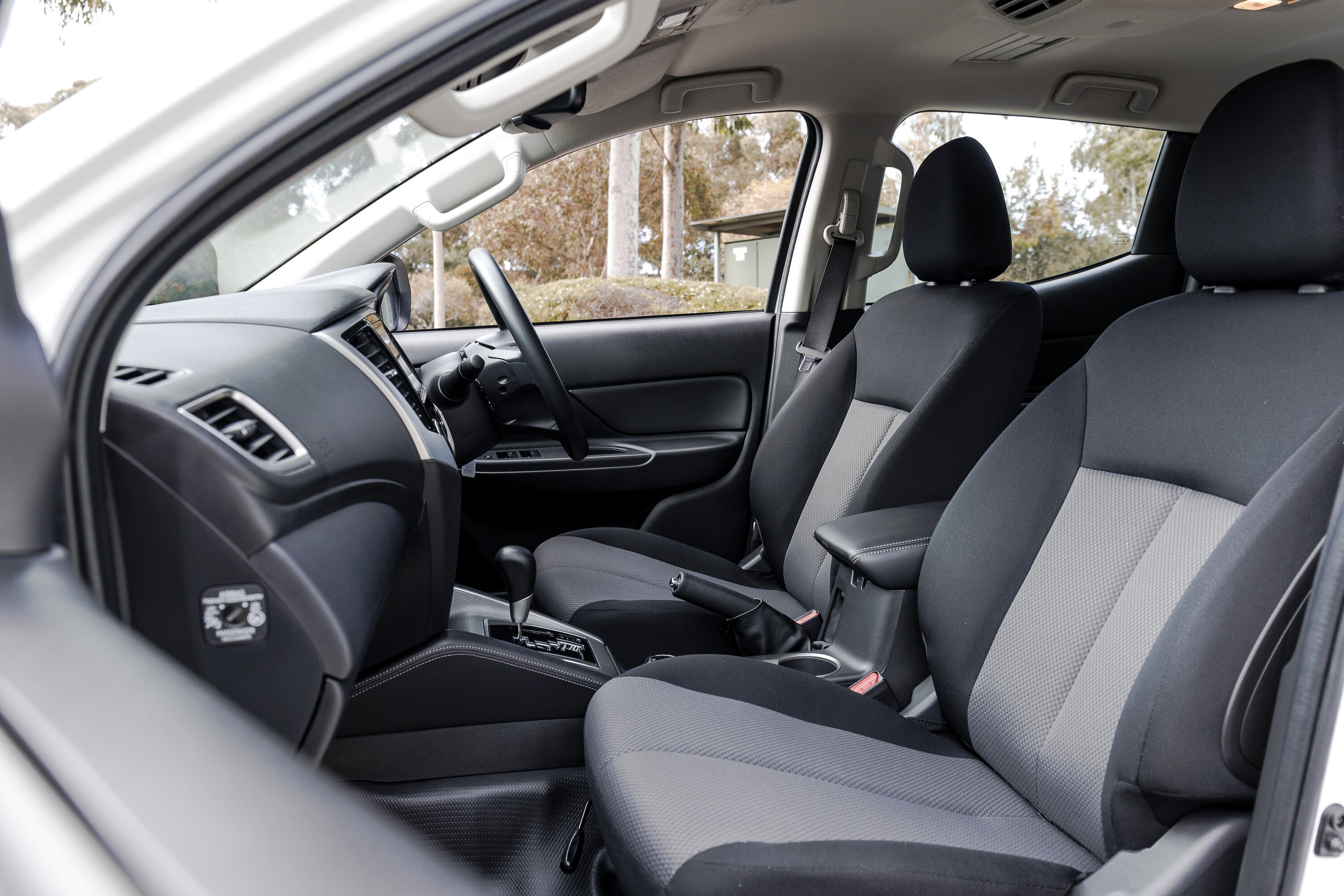
Again, there is ample storage space with cup holders, bins, and large door pockets. Sitting three abreast in the rear pews would be cozy, and there are two further USB ports (only available in top-spec GLS and GSR variants) and cup holders in the fold-down centre armrest for rear passengers.
All cab-chassis variants feature old-school manual temperature control, while only the GLS and GSR dual-cab utes feature dual-zone climate control – the rest has to make do with single zone.
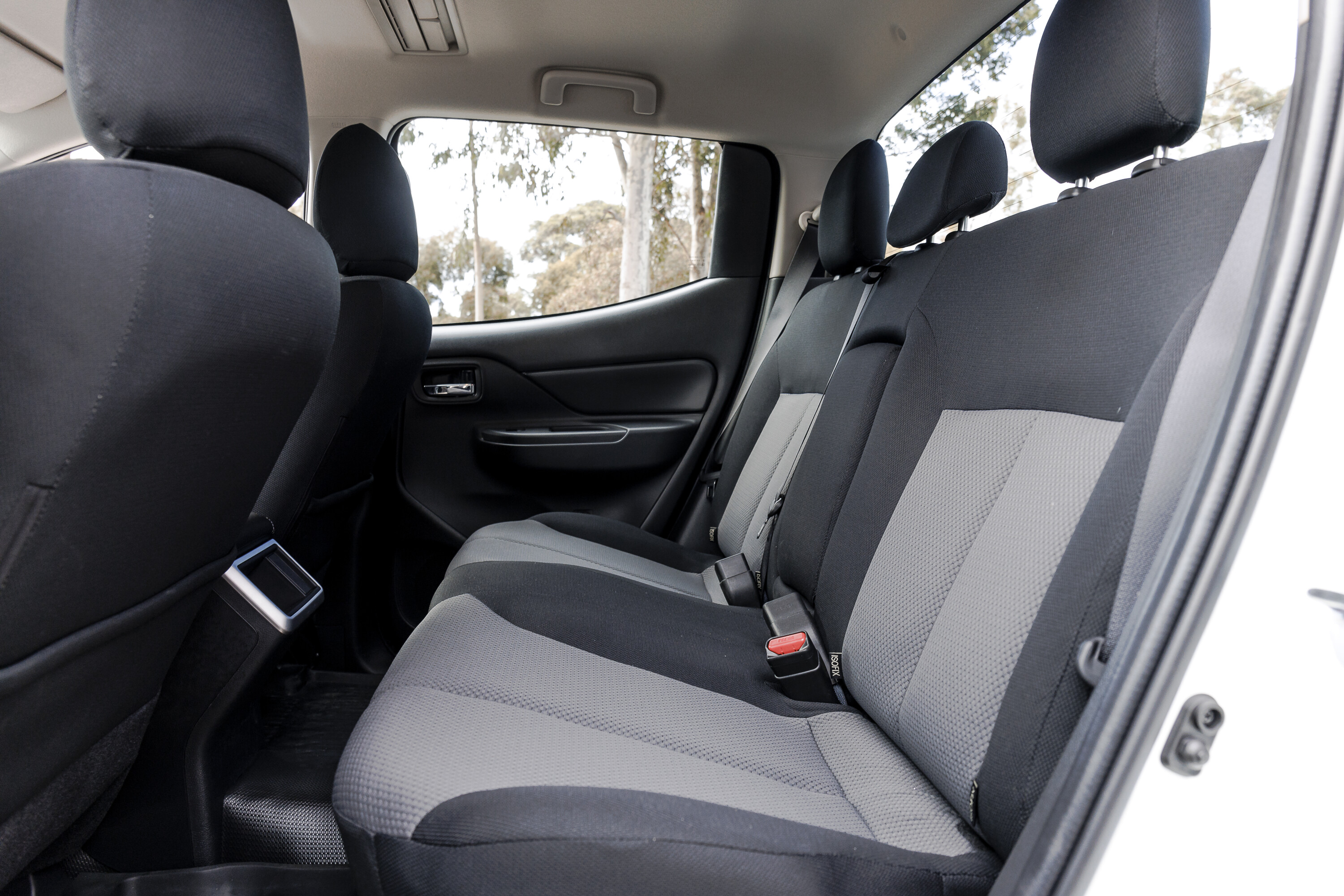
How big is the tray/tub?
How much equipment you’ll be able to load into the tub of your Triton ultimately depends on the model you opt for.
For double-cab pick-ups, the tub measures 1520mm x 1470mm x 475mm, with 1085mm between the wheel arches. Opt for the club-cab and you’ll be greeted with a longer tub: 1850mm x 1470mm x 475mm, with the same 1085mm between the wheel arches.
The size of the tray in the cab-chassis variants depends entirely on the size of the tray fitted.
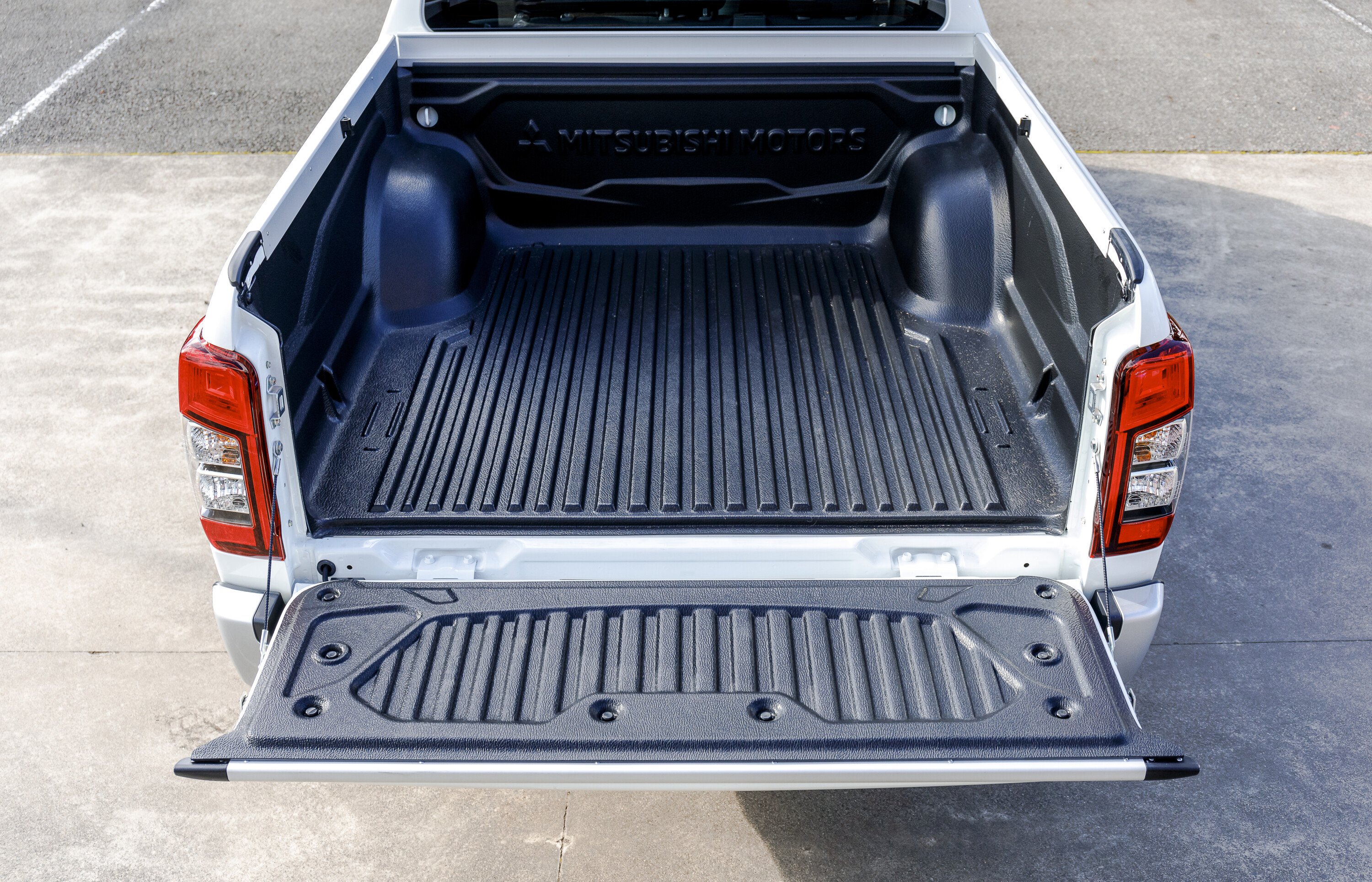
I like driving, will I enjoy this car?
For a ute, the Triton MR is rather nimble and tidy on-road.
The entire Triton range is powered by Mitsubishi’s long-serving 2.4-litre turbo-diesel four-cylinder diesel engine, which generates 133kW at 3500rpm and 430Nm at 2500rpm. It is mated to either a six-speed automatic or six-speed manual transmission. Well-matched to the powertrain, the transmission will rarely hunt for gears, more often than not finding the sweet spot.
Diesel rattle is prominent, but the GLX+ feels more car-like compared to some of its similarly-priced contemporaries. Fitted with leaf springs at the rear and coils up front, the GLX+ in particular feels settled on both bitumen and mild dirt tracks, soaking up larger bumps with aplomb.
Its hydraulically-assisted steering feels dialled-in and well-connected to rain-soaked dirt roads, something which can’t be said of other utes in the around-$40K category. Drive it back-to-back with the GWM Cannon-X and you’ll know exactly what we mean.
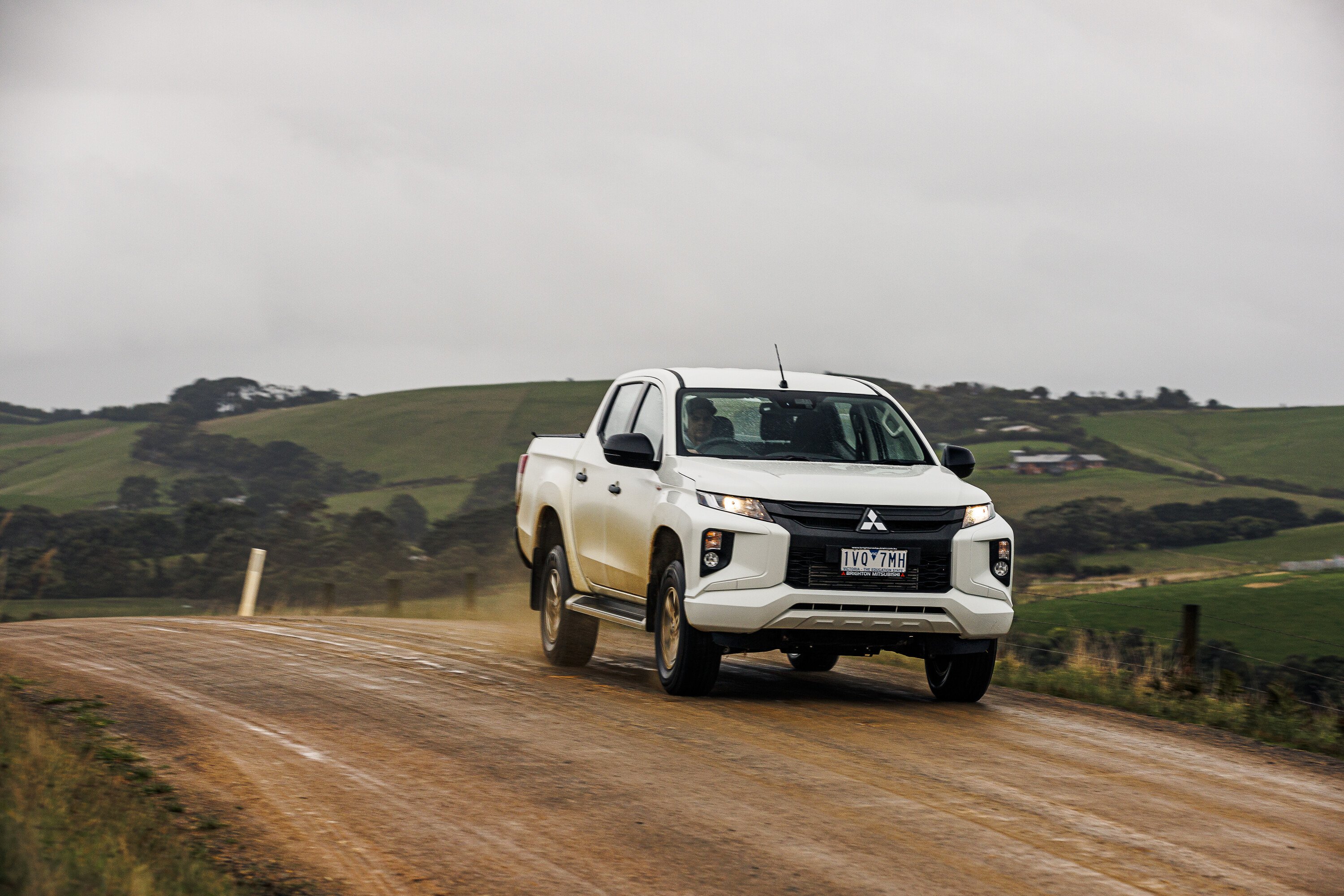
All models except for the GLS and GSR pickups miss out on Mitsubishi’s Super Select II 4×4 system; instead relying on the more rudimentary Easy Select 4WD system to modulate between 2H, 4H and 4L via an easy-to-use rotary dial – flicking between 2H and 4H on the fly is a simple affair.
The GLS and GSR are also the only models equipped with selectable drive modes, which adjusts engine output, transmission settings and traction control to best suit the terrain, be it Gravel, Mud/Snow, Sand or Rock.
Ground clearance ranges from 200mm to 220mm, depending on the variant. From the factory, the GLX+ is fitted with 16 x 7-inch steel wheels inside 245/70R16 tyres. Opt for the GSR and you’ll get alloys in lieu of steel.
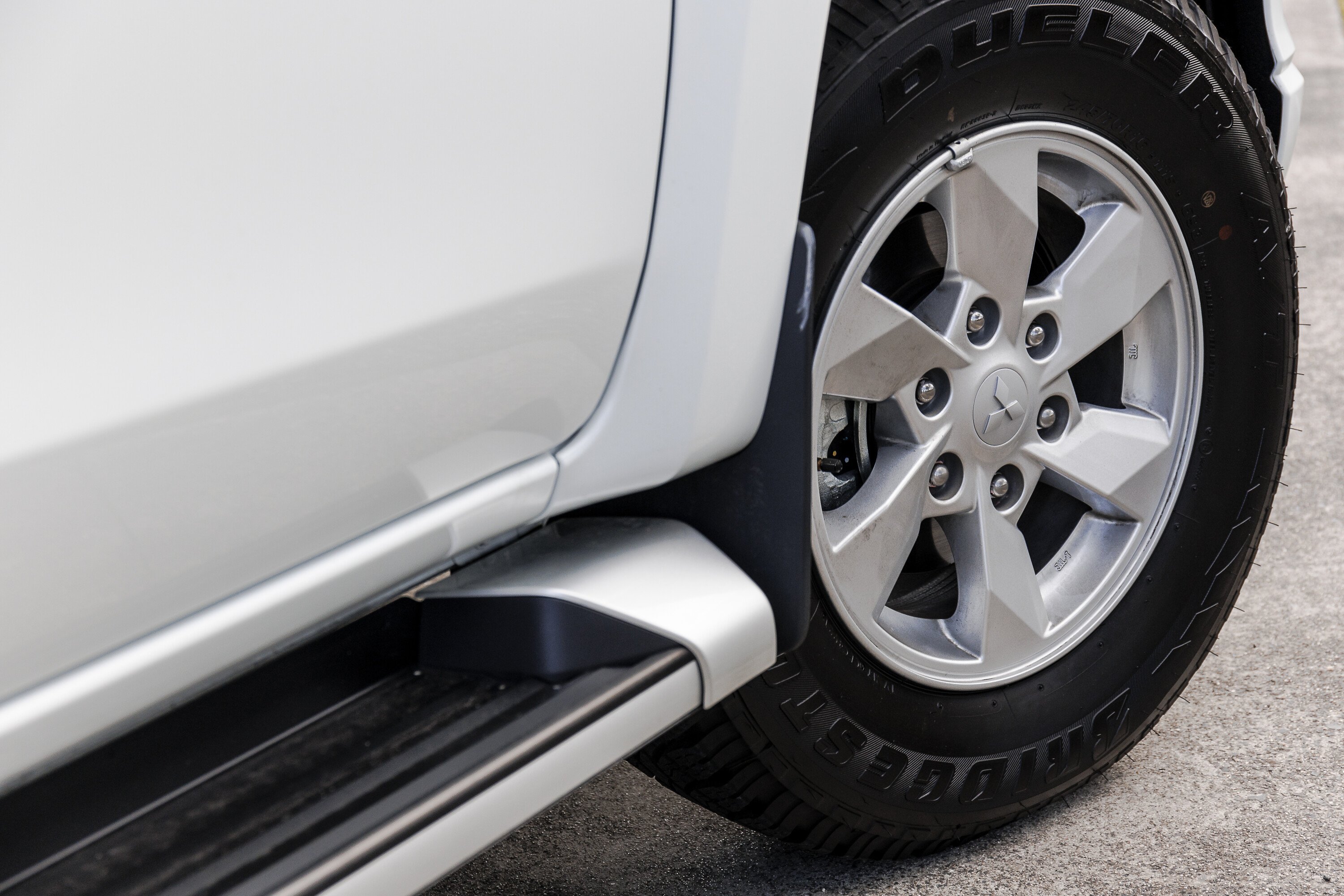
Which Mitsubishi Triton MR engine uses the least fuel?
All 2023 Triton models are equipped with the 2.4L DOHC MIVEC 16 valve common-rail intercooled diesel engine and conservative 75-litre fuel tank.
According to official manufacturer claims, the GLX single-cab cab-chassis 2WD variant with the six-speed manual transmission uses the least amount of fuel, at 7.8L/100km. 2WD double-cab models drink 8.4 litres of diesel per 100km.
All 4WD models in the Triton line-up are said to consume 7.9L/100km (manual) and 8.6L/100km (auto).
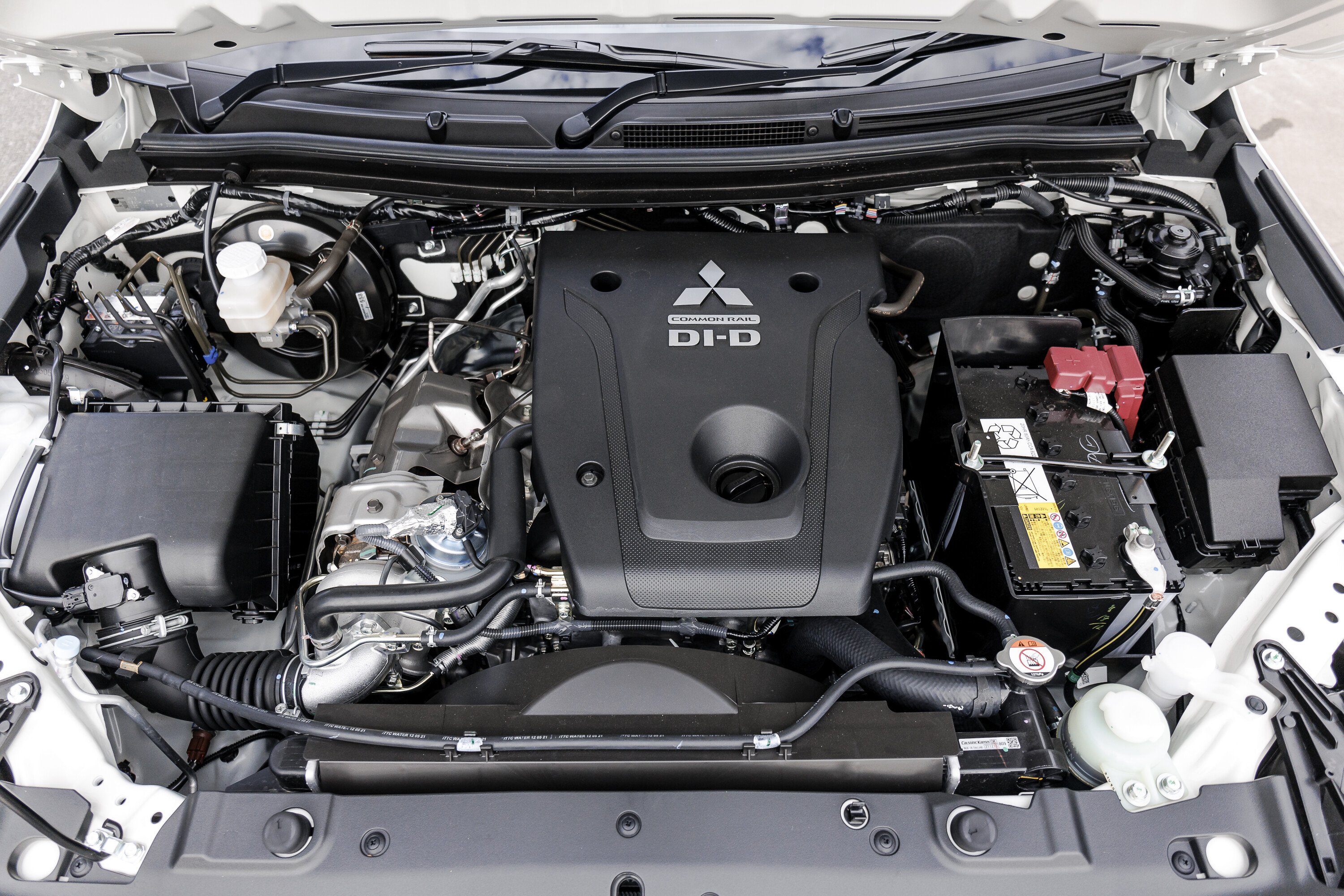
What is the Mitsubishi Triton MR’s towing capacity?
Depending on the variant, the Mitsubishi Triton has several towing capacities.
The GLX single-cab cab-chassis (man/auto) has a braked towing capacity of 2500kg. That’s increased to 3000kg for the GLX and GLX-R 2WD variants, as well as the following 4WD models: GLX single-cab cab-chassis, GLX club-cab cab-chassis (man/auto), and GLX+ club cab pick-up.
The GLX double-cab cab-chassis (man/auto), GLX double-cab pick-up, GLX+ double-cab pick-up (man/auto), GLX-R double-cab pick-pp, GLS double-cab pick-up (man/auto), and GSR double-cab pick-up all have the highest towing capacity in the line-up, at 3100kg.
The Triton’s maximum towing capacity of 3100kg is below the industry standard of 3500kg.
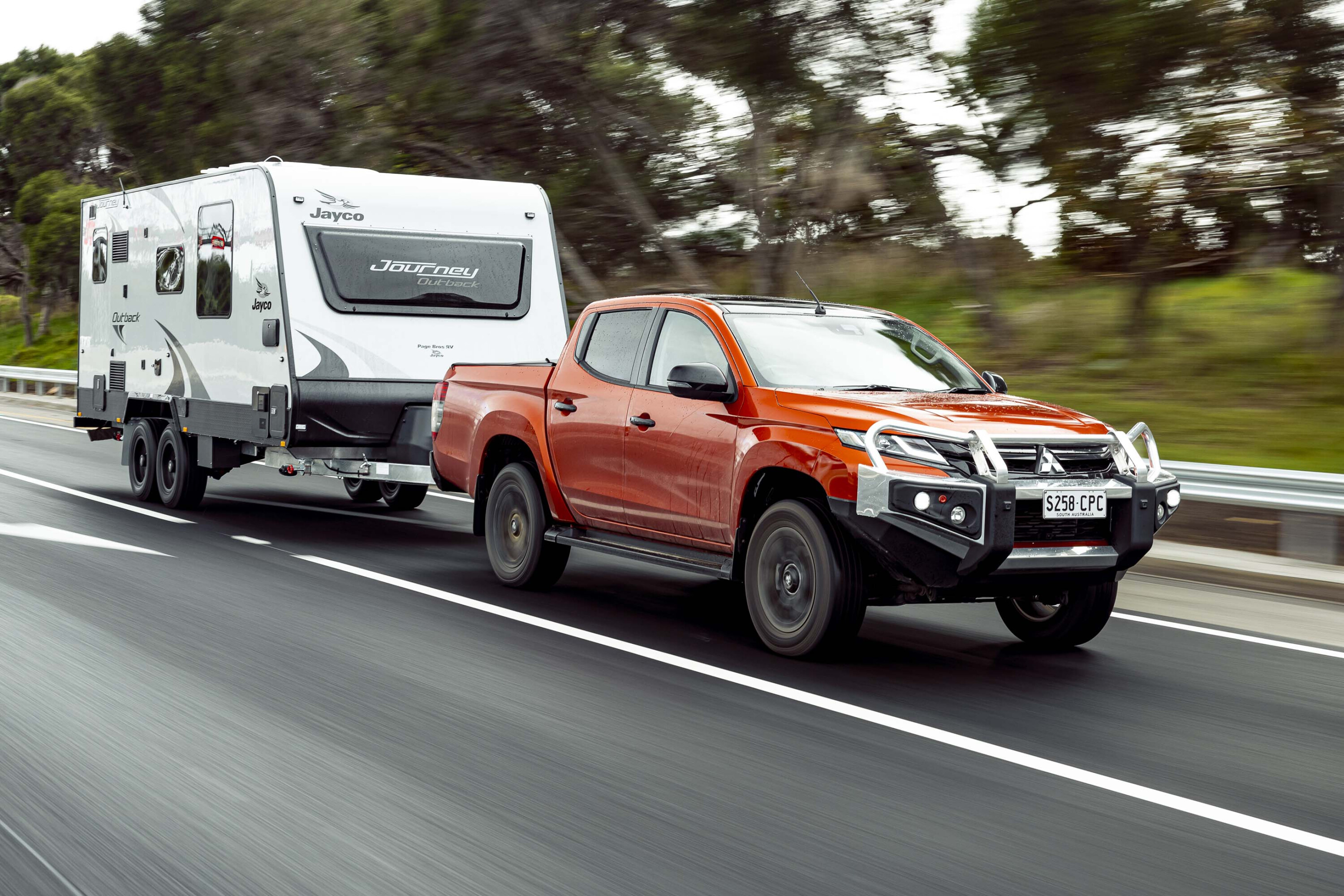
How long is the warranty and what are the Triton’s servicing costs?
The Mitsubishi Triton comes with the industry’s longest factory warranty – ten years / 200,000km.
The Mitsubishi Triton comes with 15,000 km / 12-month service intervals and an industry-leading 10-year capped-price servicing scheme, with the first interval priced at $399. Prices then fluctuate between $499 and $999 for the length of the servicing program.
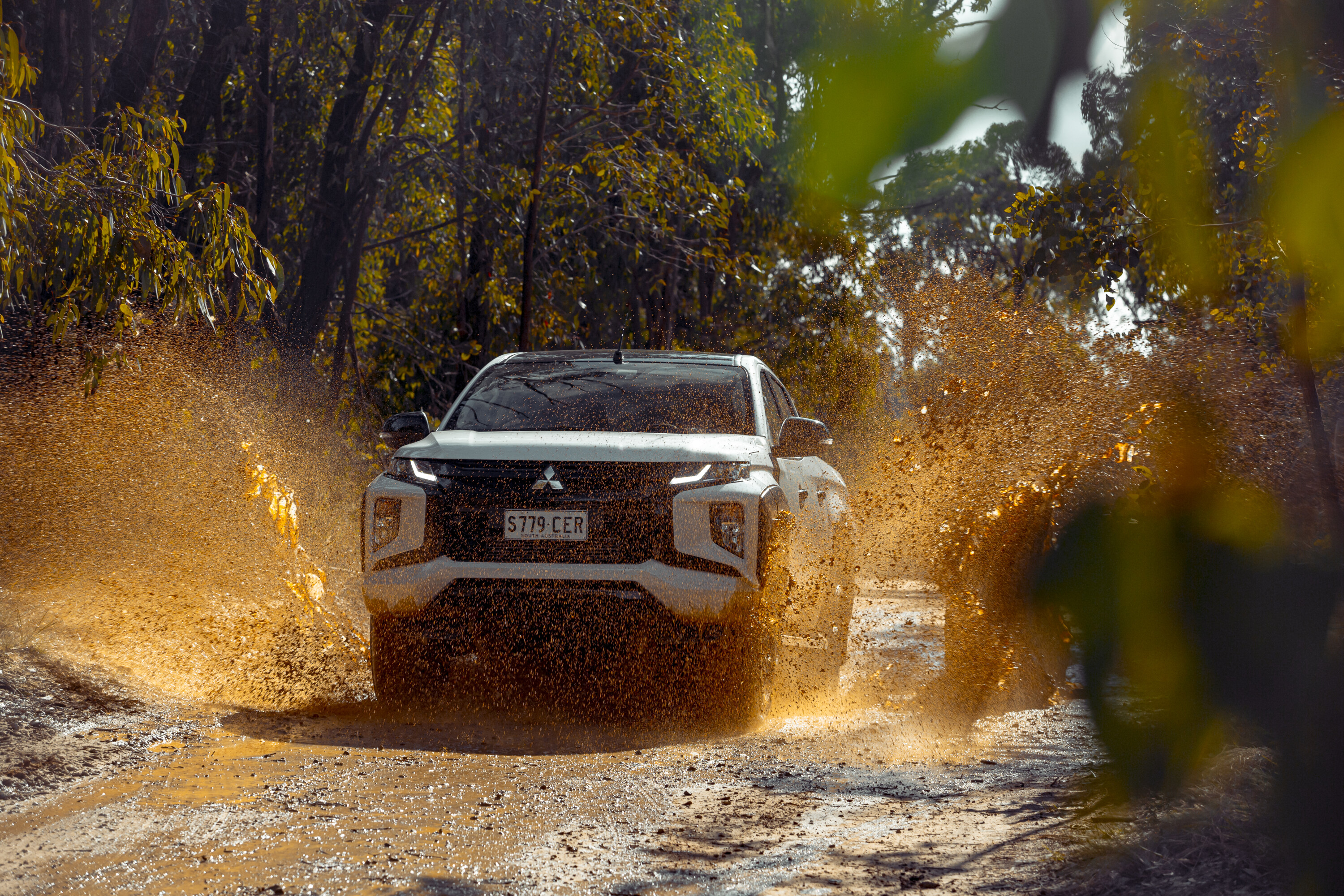
Which version of the Mitsubishi Triton does 4X4 Australia recommend?
Our reviewers like the Triton GLX+ 4×4. That it’s almost $10K cheaper than the GSR makes it a viable and enticing proposition.
It misses out on some of the nice features the GSR boasts, but you’re still left with a great platform, albeit one with a dated interior.
Overlook these minor shortcomings and the Triton GLX+ makes a lot of sense at this compelling price point.
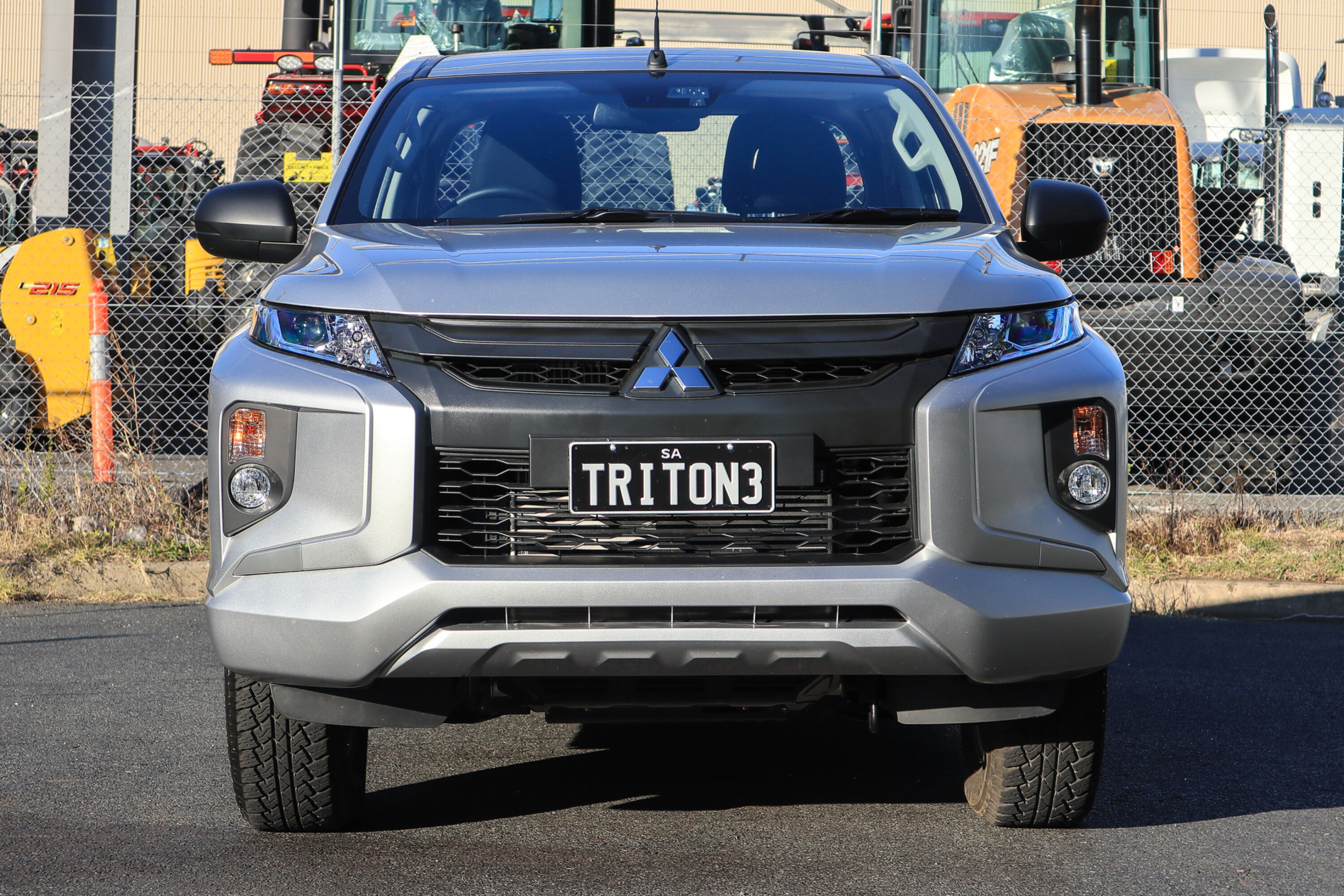
What are the Mitsubishi Triton’s key rivals?
ud83dudd3c Back to topScore breakdown
Things we like
- Value
- Handier in town than key alternatives
Not so much
- Not as big or as powerful as some, lower towing capacity than rivals


